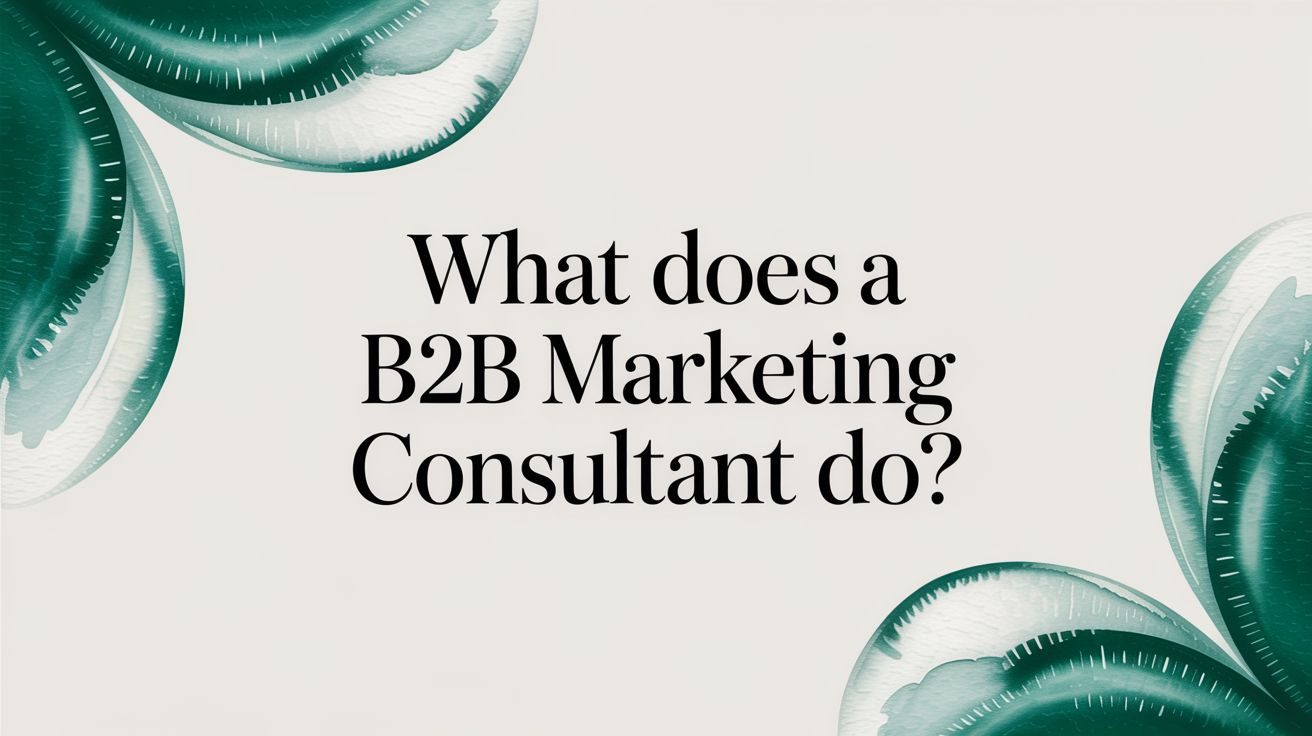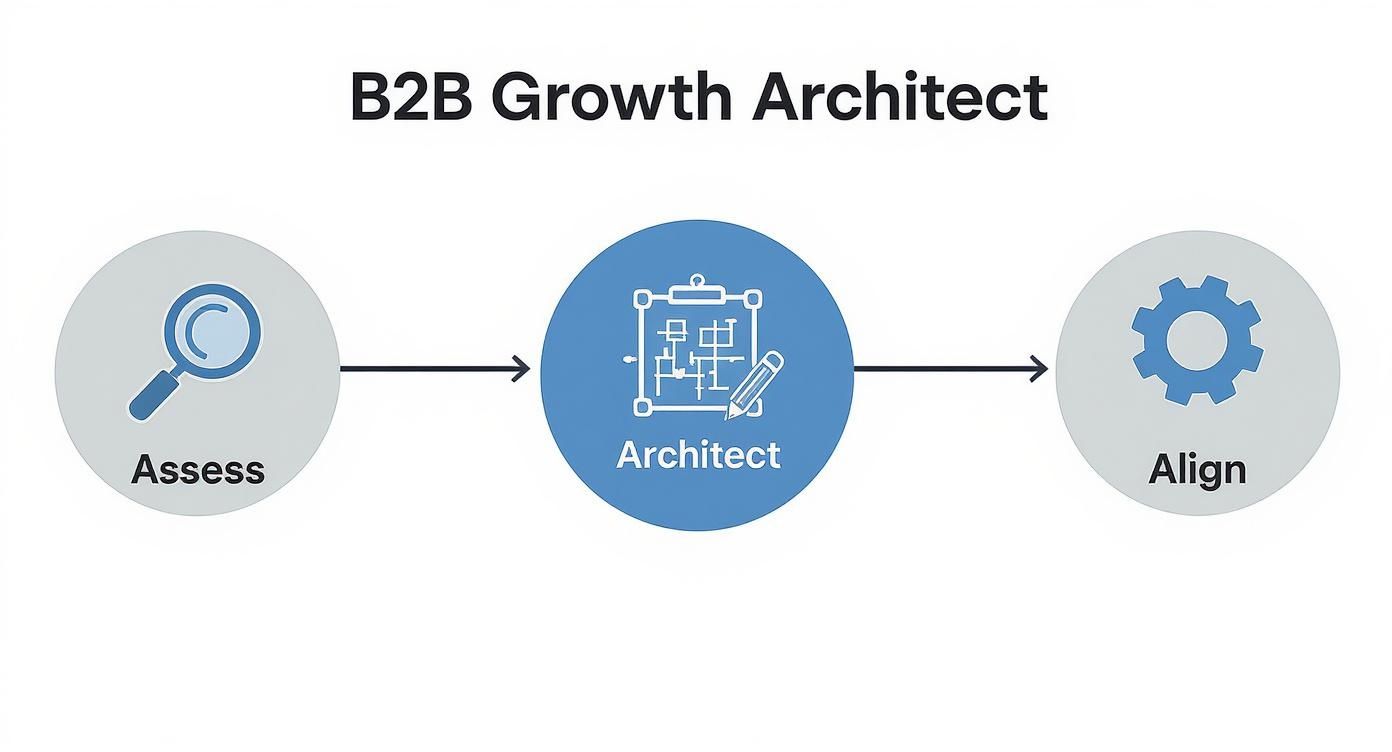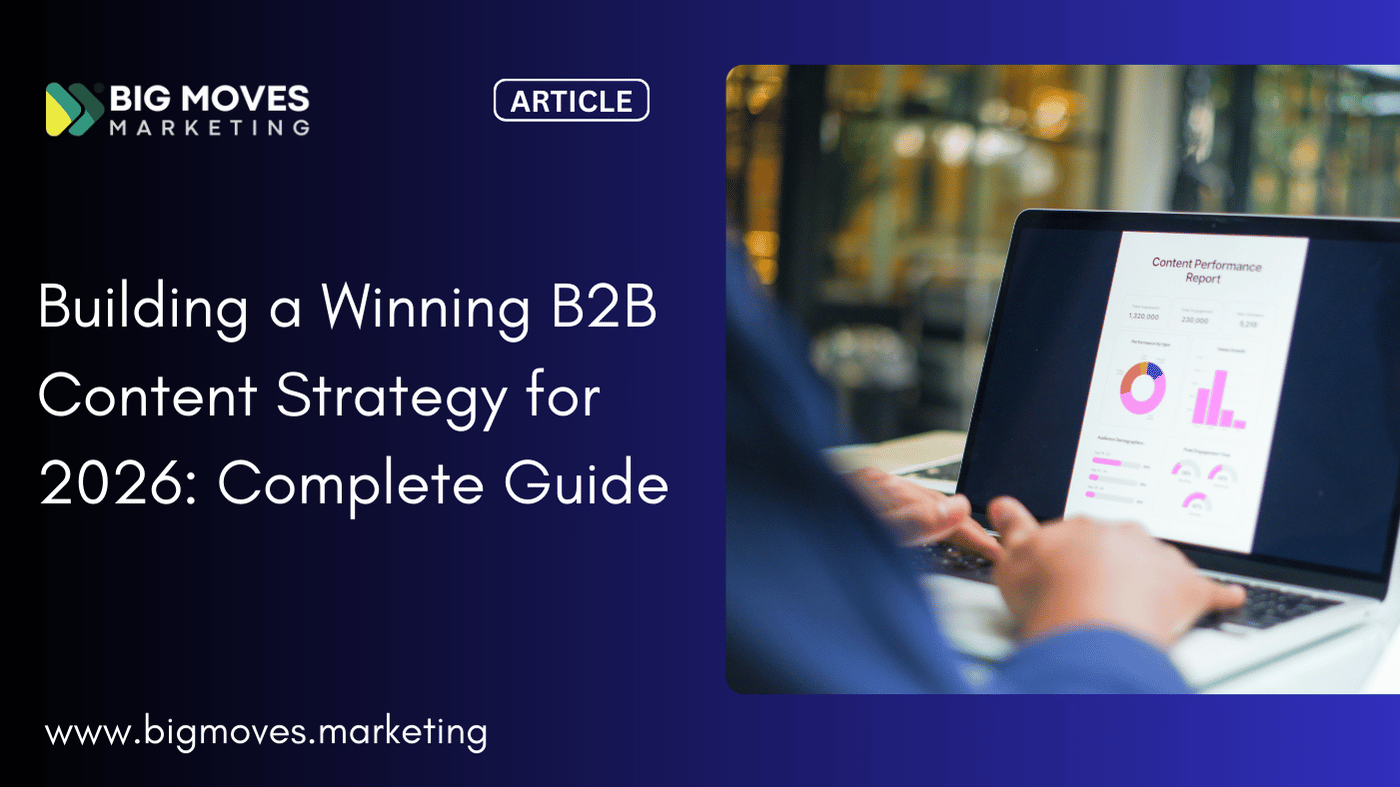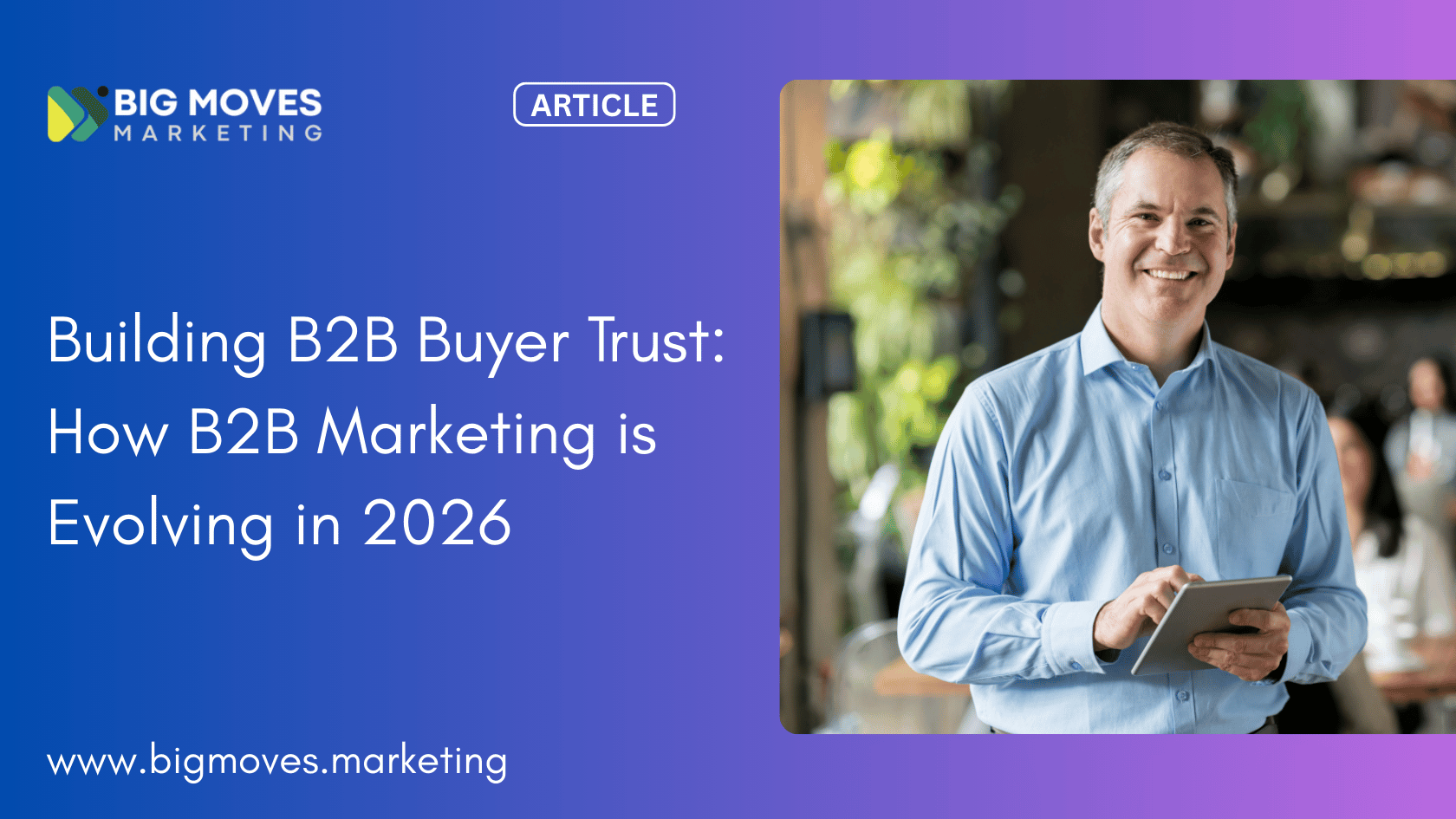What Does a B2B Marketing Consultant Do?

So, what exactly is a B2B marketing consultant? Think of them less as a vendor and more as a strategic partner who lives and breathes the world of business-to-business sales. They specialize in navigating the long, complex sales cycles and sophisticated buyer journeys that are unique to B2B companies.
For founders, a consultant brings an outside perspective and proven frameworks to solve tough challenges, from stalled growth to lead generation that just isn’t delivering. Their core job is to help you build a predictable revenue engine.
Why Smart Founders Hire a B2B Marketing Consultant

Many founders hit a wall. Growth flattens out, marketing efforts start to feel disjointed, and the path forward gets foggy. It’s a common—and incredibly frustrating—stage. You know you have a great product, but turning its value into a steady stream of qualified leads? That's a completely different challenge.
This is the exact moment when bringing in a B2B marketing consultant becomes a game-changing move. Don't think of them as just another advisor; see them as a growth architect. They don't just toss out a few suggestions. They deliver a blueprint for success, helping you build a marketing function that’s both efficient and ready to scale.
Ultimately, their job is to inject clarity and momentum into your most tangled marketing problems.
Pinpointing the Need for Expert Guidance
The decision to call for backup usually comes after hitting a few specific roadblocks. These pain points are clear signals that your current approach needs more than a simple tweak—it needs a strategic overhaul.
Founders typically start looking for a consultant when they’re dealing with:
- Stagnant Growth: Your revenue has plateaued, and the marketing tactics that used to work are no longer moving the needle.
- Ineffective Lead Generation: You're pouring money into campaigns, but the return is a trickle of low-quality leads that sales can't close.
- Strategic Confusion: You're not sure which digital channels to double down on or how to craft a message that actually connects with your ideal customer.
A B2B marketing consultant steps in to diagnose these issues with a fresh, objective eye. They’ve seen these problems before in dozens of other companies, giving them a perspective your internal team simply can't have. To get a better sense of what defines this role, it's worth exploring what makes a true B2B marketing expert.
A consultant's value isn't just in what they know, but in their ability to apply that knowledge to your specific business model, market, and goals. They connect your product's potential to a practical, results-driven marketing system.
The True Role of a B2B Growth Architect
Let’s get one thing straight: a top-tier B2B marketing consultant isn't someone you hire to just execute tasks. They aren't just an extra pair of hands. The best ones operate on a much higher level—they are growth architects.
They don't just patch holes in your marketing. They design the entire blueprint for a sustainable, predictable revenue engine.
Think about building a skyscraper. You wouldn't just show up with a pile of bricks and hope for the best. An architect first has to assess the foundation, understand the purpose of every floor, and design a structure that can handle whatever the world throws at it. That's exactly what a B2B consultant does for your company's growth.
They start by digging deep into the fundamentals of your go-to-market strategy. This isn’t a quick, surface-level audit; it's a full diagnostic on your market position, the clarity of your ideal customer profiles, and your team's actual capabilities. Only after understanding the foundation can they start drafting the strategic plans that will actually support your big ambitions.
From Founder Vision to Actionable System
Every founder has a powerful vision. The real challenge, however, is translating that vision into a measurable, day-to-day marketing system that actually works. This is precisely where a growth architect shines. They are the bridge between your big-picture goals and the tactical execution needed to make them a reality.
For instance, a founder might say, "We need to become the number one solution for enterprise fintech companies." A consultant takes that powerful idea and turns it into an actionable blueprint:
- Define "Number One": What does that actually mean? Are we talking market share, revenue, or brand recognition? Let's get specific.
- Identify the Battlefield: Who are the key adversaries standing in our way, and where are their weak spots we can exploit?
- Map the Buyer's Journey: What specific content, emails, and touchpoints will it take to guide a busy enterprise CFO from just hearing about us to signing a contract?
This process transforms a bold, abstract idea into a series of coordinated, measurable marketing efforts. It makes sure every single dollar spent and every hour invested is pushing you directly toward your most critical business goals.
A consultant’s core function is to build a system where growth isn't a matter of luck, but a predictable outcome of a well-designed plan. They make revenue generation a science, not an art.
Aligning Every Effort with Business Goals
One of the most common traps for B2B startups is what I call "random acts of marketing"—a flurry of activity without any connecting thread. You might be running ads, publishing blog posts, and attending events, but if these actions aren't part of a unified strategy, they just become expensive distractions.
A consultant acts as the strategic conductor, ensuring every instrument in the orchestra is playing the same tune.
This strategic oversight is more critical now than ever. The demand for real strategic guidance is fueling massive growth in the consulting world. A 2025 study of 384 consulting firms found that the fastest-growing players expanded at a compound annual growth rate of 41.7% over three years—a staggering 4.4 times faster than the average firm. High-performers are clearly setting a new standard for strategic value.
So what does this alignment look like in practice? It might mean connecting your content strategy directly to your sales team's needs. Instead of just creating "content for content's sake," the consultant ensures your blog posts and whitepapers answer the exact questions your ideal buyers are asking during the sales process.
For an even deeper look at how this high-level strategy is managed, many businesses wonder about the responsibilities of a fractional CMO, a role that often overlaps with a B2B marketing consultant. To clarify the distinctions, you can learn more about what a fractional CMO does and how they drive growth. Ultimately, a growth architect ensures that every marketing move is a deliberate step toward your ultimate business objectives, creating a cohesive and powerful growth machine.
What B2B Marketing Consultants Actually Do
A B2B marketing consultant does more than just offer advice. They deliver a structured set of services designed to build a powerful, self-sustaining growth engine for your company. Think of these services as the building blocks for a strategic blueprint that turns your vision into real business outcomes.
It’s a bit like assembling a high-performance vehicle. You need a powerful engine (lead generation), a precise navigation system (strategy), premium fuel (content), and an expert mechanic to tune everything perfectly (tech stack optimization). Each service addresses a specific, critical piece of B2B growth.
Strategic Planning and Roadmapping
The very first thing a consultant does is create a clear, actionable marketing strategy. This isn’t some theoretical document that collects dust on a shelf. It’s a living roadmap that guides every single decision, from how you allocate your budget to which campaigns you run.
To start, a consultant dives deep into your business. They’ll get to know your market, your customers, and your rivals inside and out. Consultants are experts at implementing effective competitive intelligence strategies to figure out where you stand. From there, they’ll validate your market positioning and set realistic, measurable goals that tie directly to your revenue targets.
What you get is a documented plan that answers the big questions: who are we targeting, what’s our unique message, which channels will we use to reach them, and how will we measure success? This clarity is the foundation for all future growth.
Developing Predictable Lead Generation Systems
For any B2B company, sporadic leads just won't cut it. You need a predictable, scalable system that consistently fills your sales pipeline with qualified opportunities. A consultant’s job is to architect that exact system.
This involves much more than just running a few ads. It’s about designing a multi-channel approach that captures, nurtures, and converts leads throughout what is often a long and complex buyer’s journey. This usually means a smart mix of paid acquisition, organic search, and targeted outreach working together.
This diagram shows how a growth architect assesses your foundational elements, designs a strategic plan, and aligns all your marketing activities to hit those big business goals.

As you can see, a consultant's work is a continuous cycle of assessment, design, and alignment, ensuring the marketing engine is always tuned for peak performance.
Crafting a Full-Funnel Content Strategy
Content is the fuel for your lead generation engine, especially in B2B where buyers are highly educated and do a ton of research. A consultant doesn’t just suggest writing a few blog posts; they design a full-funnel content ecosystem. This means creating specific assets for every stage of the buyer's journey.
- Top-of-Funnel: Think blog posts and articles that attract prospects who are just becoming aware they even have a problem.
- Middle-of-Funnel: This is where whitepapers, webinars, and case studies come in, helping prospects evaluate potential solutions.
- Bottom-of-Funnel: Finally, product demos, detailed spec sheets, and implementation guides help seal the deal.
The data backs this up. 91% of B2B marketers use content marketing in their plans, and 74% report that it’s a major lead driver. This is precisely why a solid content strategy is non-negotiable for growth.
Implementing Account-Based Marketing (ABM)
When you're targeting high-value accounts, casting a wide net is just plain inefficient. This is where Account-Based Marketing (ABM) comes into play. A consultant can help you implement a focused ABM strategy, essentially treating each key account as its own individual market.
ABM involves aligning your sales and marketing teams to create highly personalized campaigns for a hand-picked list of target companies. Instead of fishing with a net, you're using a spear to land the exact clients you want. The consultant helps identify those targets, develop the right messaging, and coordinate outreach across multiple channels.
For a complete overview, check out our guide to the essential B2B marketing services that drive this kind of growth.
Optimizing the Marketing Technology Stack
Modern marketing runs on technology—from your CRM and marketing automation platform to all the analytics tools you use. But just having the tools isn’t enough. They need to work together effectively.
A B2B marketing consultant will audit your current tech stack to find gaps, redundancies, and integration headaches. They make sure your tools are not just functional but are actually configured to give you clear, actionable data. This optimization helps you accurately track ROI, make your team more efficient, and get the most out of your technology investments.
One of the most common questions founders ask is how a consultant's role differs from that of an in-house marketing manager. While there can be overlap, their core focus and strategic orientation are quite different. This table breaks it down.
B2B Consultant Services vs In-House Marketing Manager Roles
Ultimately, a consultant is the architect who designs the blueprint for your marketing house, while an in-house manager is the skilled builder who brings that blueprint to life day in and day out. Many companies find they need both to truly scale.
So, When Do You Actually Need a Consultant?
Figuring out you need a B2B marketing consultant is rarely a single "aha!" moment. It's more like a slow-burn realization that something is fundamentally stuck. It’s that nagging feeling your team is spinning its wheels, burning through cash without a clear return, and watching others pull ahead while you’re stuck in neutral.
Those feelings are almost always tied to specific, painful business problems. If any of the scenarios below feel a little too familiar, it's a strong sign that bringing in an outside expert isn't a luxury—it's the necessary next step to get your growth engine firing again.
Your Lead Funnel Is More of a Sieve
Are you pouring leads into the top of your funnel, only to watch them disappear before they ever become real sales opportunities? This is the classic leaky bucket problem. Your ads and content might be attracting eyeballs, but those potential customers are slipping through cracks somewhere in the middle.
A B2B marketing consultant basically acts like a plumber for your funnel. They come in and meticulously inspect every joint and connection, from that first flicker of awareness all the way to conversion, to find and patch the holes.
Maybe your messaging isn’t connecting with serious buyers. Or perhaps you don't have the right content to guide prospects through a long, complex B2B sales cycle. A consultant brings a fresh, objective eye to figure out exactly why people are dropping off and then builds the systems to keep them engaged.
A consultant’s goal is to turn your funnel from a sieve into a well-oiled pipeline. They make sure the valuable leads you attract are carefully guided toward a sales conversation, not lost to neglect or confusion.
Your Sales and Marketing Teams Are Basically Rivals
Does this sound familiar? Sales complains that marketing's leads are junk. Marketing complains that sales doesn't follow up on the great leads they're sending over. When this is happening, you've got a massive internal problem that’s costing you a fortune in wasted ad spend and lost deals.
This kind of friction almost always comes down to one thing: a total lack of a unified strategy. The two teams are chasing different goals, using different definitions of a "good lead," and have zero shared accountability for the only number that matters—revenue.
A b2b marketing consultant acts as a neutral third party to bridge that gap. Their job is to create a single, shared playbook that gets both teams rowing in the same direction. They help you nail down crystal-clear definitions for what makes a lead ready for marketing (MQLs) and what makes one ready for sales (SQLs), then build the process for a seamless handoff. This turns that old rivalry into a powerful partnership focused on growth.
You're Spending on Marketing with No Clue What the ROI Is
Be honest: you're putting money into ads, content, and maybe even events. But if someone asked you to point to exactly which activities were driving revenue, could you answer with confidence? Many B2B companies fall into this trap of "random acts of marketing"—lots of activity, but zero accountability.
This happens when you don't have a clear system for tracking performance from the very first touchpoint to the final signed contract. Without proper attribution, you're flying blind. You have no real way of knowing what's working and what's just a waste of money.
A consultant fixes this by building a rock-solid measurement framework. They'll connect your marketing platforms to your CRM, set up dashboards that actually make sense, and help you focus on the key performance indicators (KPIs) that truly impact the bottom line. This is what allows you to finally make data-driven decisions, double down on what works, and prove the direct financial return of your marketing.
How to Choose the Right B2B Marketing Consultant
Picking a B2B marketing consultant is one of those make-or-break decisions a founder faces. This isn’t about filling a gap with a contractor; you’re handing over a piece of your company’s growth story to a strategic partner.
Get it right, and you can unlock incredible momentum. But the wrong choice? That leads to wasted time, a torched budget, and a whole lot of frustration.
The selection process has to go way beyond just glancing at their website and a list of past clients. You need to dig in and find a genuine partner—someone who not only has the chops but truly gets your company’s mission and culture. You're looking for a growth architect for your business.
Look Beyond the Polished Case Studies
Every consultant is going to show you their greatest hits. You’ll see the case studies with impressive results and glowing client quotes. While those are important, they're only telling you part of the story.
Your job is to peek behind the curtain. You need to understand the how and the why behind those wins.
Don’t just take the highlight reel at face value. A truly confident, seasoned B2B marketing consultant will be transparent about their entire process, not just the home runs. They know B2B growth is rarely a straight line; navigating obstacles is part of the gig.
The most insightful conversations aren't about the strategies that worked perfectly from day one. They're about the ones that didn't—and how the consultant diagnosed the problem, adapted the plan, and steered the project back toward success.
To really get to the heart of their skills, you have to ask questions that reveal how they solve problems and how resilient they are under pressure.
Crucial Questions to Uncover True Expertise
When you're in the interview, move past the generic stuff. Focus on digging into their strategic thinking and how they actually operate. The answers you get will tell you far more than any resume or client list ever could.
Here are a few powerful questions to guide the conversation:
- "Walk me through your diagnostic process. What are the first five things you would want to know about our business?" This shows you if they have a structured way of thinking or if they just throw tactics at the wall.
- "Describe a time a B2B marketing strategy you developed failed or produced unexpected results. What did you learn, and how did you pivot?" This is a test for honesty, adaptability, and their ability to learn from missteps—all absolutely critical traits.
- "How do you define and measure success for a client like us? Can you give an example of the key metrics you would focus on in the first 90 days?" You're listening for answers that go beyond vanity metrics like website traffic. They should be talking about real business outcomes like qualified leads, sales pipeline contribution, and customer acquisition cost.
- "How do you prefer to communicate with your clients? What is your typical rhythm for meetings, reporting, and updates?" This is all about making sure their working style meshes with your team's workflow and expectations.
The quality of their answers—the depth, the specific examples, and the confidence they show when talking about challenges—will paint a very clear picture of what it would be like to work with them.
Evaluate Experience with Similar Business Models
B2B isn't just one big category. The marketing playbook for a self-service, product-led growth (PLG) SaaS company looks completely different from one for an enterprise software solution with a nine-month sales cycle.
It is absolutely crucial that the consultant you choose has direct, hands-on experience with a business model similar to yours.
Make sure you get specific about their experience in areas that matter to your business:
- Sales Cycle Length: Have they built marketing systems for long, complex sales journeys that involve a whole committee of decision-makers?
- Target Audience: Do they have a track record of marketing to the same kinds of professionals or industries you're going after?
- Deal Size: Are they used to building strategies that support high-value, enterprise-level deals, or are they more comfortable with a higher volume of smaller contracts?
Having this specific, relevant experience means the consultant won't be learning the ropes on your dime. They can hit the ground running with proven frameworks, getting you to results much faster. This is often the key difference when you're deciding between a generalist and a specialist, and it’s a big part of the debate when comparing a consultant to an agency for B2B marketing.
Your Ultimate Evaluation Checklist
To make a confident decision, you need a system. As you talk to different candidates, use this checklist to make sure you've covered all the critical bases. The right B2B marketing consultant will tick all these boxes, giving you the peace of mind you need to move forward.
- Strategic Depth: Do they demonstrate a clear, structured process for diagnosing problems and building a strategic roadmap?
- Relevant Experience: Can they provide specific examples of success with companies that have a similar business model, sales cycle, and target audience?
- Proven Problem-Solver: Were they transparent and insightful when discussing past challenges and how they overcame them?
- Data Fluency: Do they speak confidently about the specific metrics that drive B2B growth and connect marketing activities directly to revenue?
- Communication Clarity: Is their communication style clear, direct, and aligned with how your team operates?
- Cultural Fit: Do their values and work ethic resonate with your company culture? Can you envision them as a true partner?
Choosing the right consultant is an investment in your company's future. By being thoughtful and diligent in your search, you can find a partner who will not only solve your immediate marketing challenges but also help architect the next chapter of your growth.
Maximizing Your Partnership for Incredible Results

So, you've hired a B2B marketing consultant. Don't pop the champagne just yet. This isn't the finish line; it’s the starting gun.
The real magic doesn’t come from their expertise alone. It comes from the partnership you build together. A great consultant relationship is a collaborative engine that can completely redefine your company’s growth trajectory.
Think of it like building a custom home. You could just hand an architect the blueprints and walk away, or you could work alongside them through every phase of construction. One gets you a functional house; the other gets you a masterpiece. Your engagement is what unlocks incredible results.
Building a Foundation of Trust
From day one, your job is to create an environment where your new consultant can do their best work. It all starts with radical transparency. Give them the keys to the kingdom—the good, the bad, and the ugly.
A consultant can only solve the problems they can see. Empowering them with full access to your data, your team, and your challenges isn't a risk—it's a requirement for achieving breakthrough growth.
This foundation of trust and openness allows the consultant to move beyond surface-level fixes. It lets them architect genuine, lasting solutions and transforms the dynamic from a simple client-vendor transaction into a powerful, shared mission.
Communication and Shared Accountability
Dysfunctional partnerships are often silent. The client expects magic to happen, and the consultant works in a vacuum, guessing at priorities. That’s a recipe for disaster.
In contrast, a successful partnership is built on a steady rhythm of clear, intentional communication.
Set up this rhythm from the get-go:
- Set Clear KPIs: What does "success" actually look like? Agree on the specific, measurable outcomes that will define a win. This ensures everyone is pulling in the same direction.
- Weekly Check-ins: A brief, focused meeting each week keeps projects on track, nips problems in the bud, and allows for quick adjustments. No surprises.
- Monthly Strategy Sessions: Zoom out. Use this time to review progress against your KPIs, tackle bigger-picture challenges, and plan for the quarter ahead.
This structure creates shared accountability. When both sides are deeply invested in the outcomes, the consultant is no longer just an advisor; they’re a true co-pilot on your growth journey. This is especially vital for ensuring your marketing and sales efforts are perfectly in sync. For more on that, it's worth understanding the keys to aligning sales and marketing for maximum impact.
Got Questions About Hiring a B2B Marketing Consultant?
Deciding to bring in a B2B marketing consultant is a big move for your company's future, so it’s natural to have a few questions. This is a serious investment, and you absolutely need clarity before you commit. Here are the straight-up answers to the questions I hear most often from founders.
What’s the Typical Investment for a B2B Marketing Consultant?
Most experienced B2B marketing consultants charge somewhere between $150 and $250 per hour. The final number really depends on their specific expertise, the total scope of your project, and the skills you need them to bring to the table.
You'll also find consultants who offer project-based fees or monthly retainers, which can make your budgeting a lot more predictable. Always, always ask for a detailed proposal that spells out every deliverable, the timeline, and the total investment before you sign anything. That’s how you avoid surprises later on.
Remember, you aren't just buying hours; you're investing in an outcome. The right consultant's real value is measured by the revenue growth and system improvements they deliver, not just their hourly rate.
How Long Until We See Real Results?
I get it—every founder wants to see an immediate impact. But B2B marketing is a long game. Building real, sustainable growth simply takes time.
You can usually expect to see some early traction and positive signs within the first 90 days. This could be things like better lead quality or a jump in engagement.
But the significant, revenue-driving results? Those often take 6 to 12 months to fully kick in. This timeframe gives the consultant enough runway to build foundational strategies, test different campaigns, and fine-tune the systems that will fuel your growth for years to come. Patience and a focus on consistent progress are absolutely key.
What’s the Difference Between a Consultant and an Agency?
This is a critical distinction, and one a lot of founders mix up. While both are here to help your marketing, they play fundamentally different roles on the field.
- A B2B Marketing Consultant is your strategist—the architect. They're the ones who design the growth blueprint, diagnose the core problems holding you back, and build the marketing systems for your team to run. They focus on the "why" and the "what."
- A B2B Marketing Agency is your execution team—the builders. You hire them to handle specific marketing tasks, like running your paid ads, creating content, or managing your SEO. They focus on the "how."
Choosing the right one comes down to what you need right now. If you're missing a high-level strategic plan and the systems to support growth, you need a b2b marketing consultant. If you’ve already got a solid strategy but just need more hands on deck to execute it, an agency is probably the better fit.
Ready to stop guessing and start building a predictable revenue engine for your B2B startup? At Big Moves Marketing, I partner with founders to translate great products into powerful market strategies that drive adoption and revenue. Book a discovery call today to see how we can build your growth blueprint together.
%20png%20copy.png)






%20-%20white.svg)
